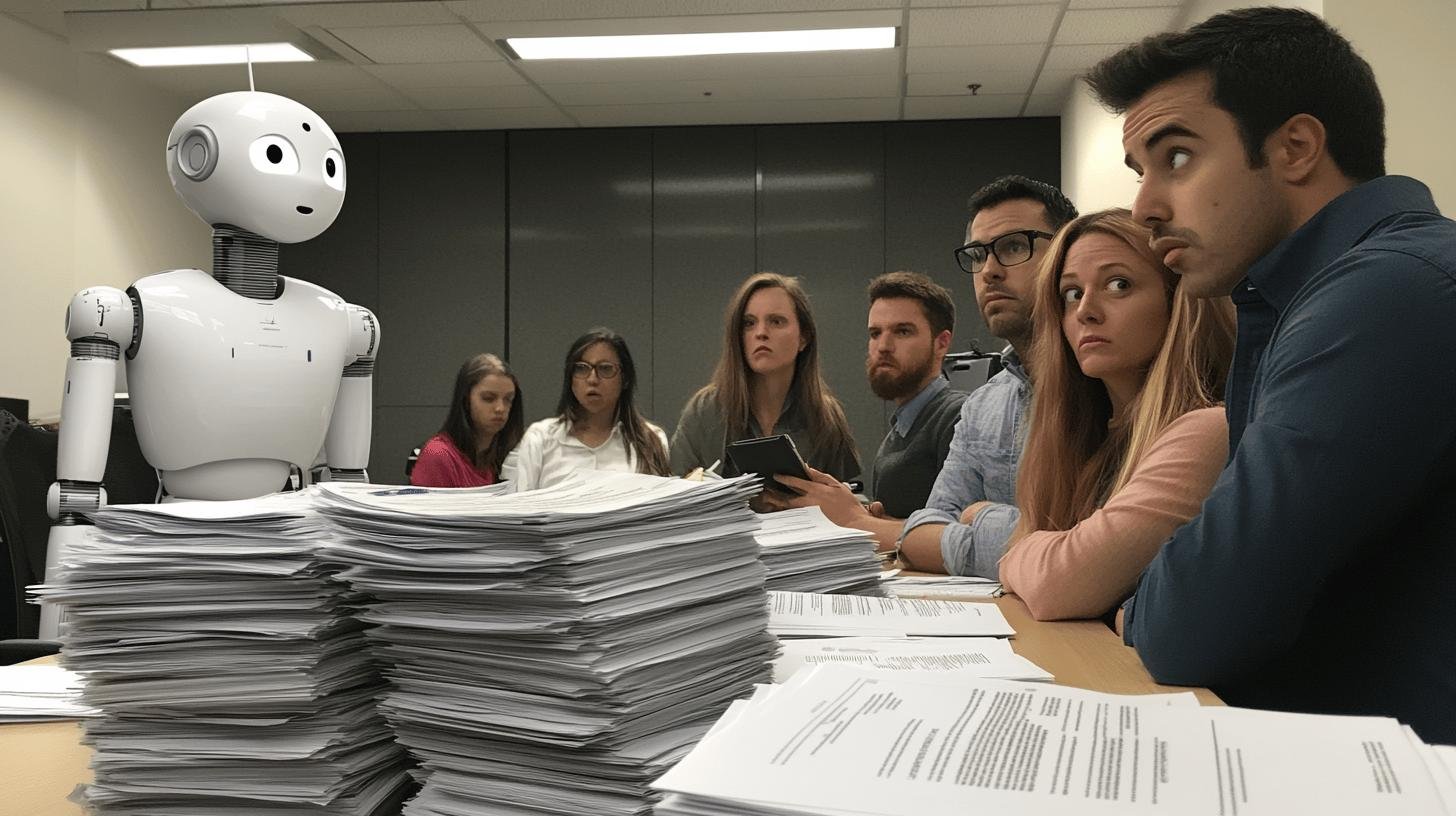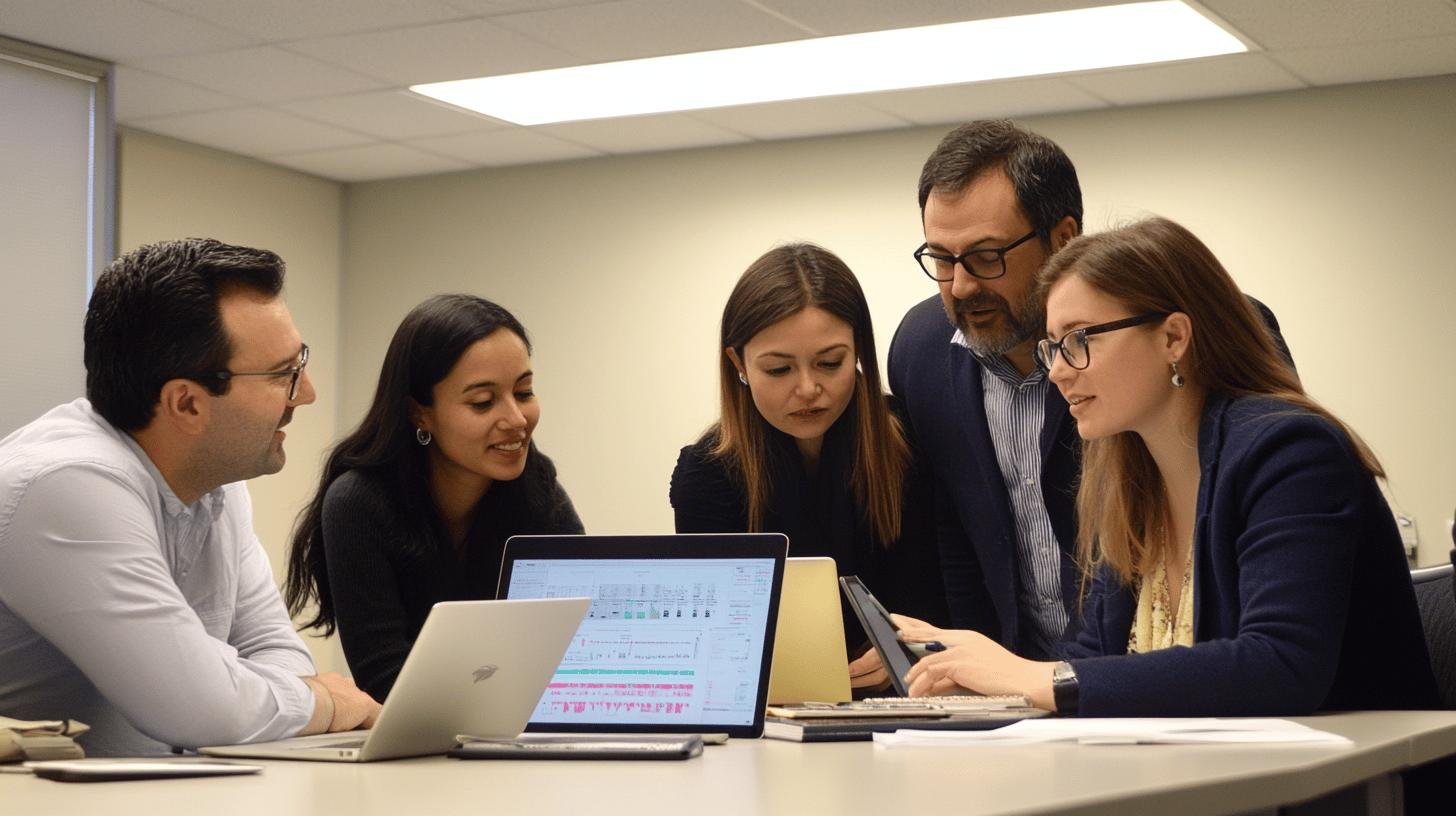Is AI in recruitment a dream come true or just another tech nuisance? Let’s face it, the thought of robots sorting through resumes can be both thrilling and chilling. For those of us curious about the pros and cons of AI in recruitment today, you’ll want to stick around. In this blog post, we will talk about how AI’s improving efficiency, cutting costs, and even making the hiring process fairer. But (and it’s a big but), there are some head-scratchers too! So, let’s get in and see what AI’s really doing with our job applications.
Pros of Using AI in Recruitment
To be able to clearly discuss the pros and cons of AI in recruitment, we would start with AI’s efficiency in recruitment. Imagine a recruitment team quickly sorting through tons of applications. AI makes this real by speeding up the hiring process. It manages large amounts of data effortlessly. Automating routine tasks also saves businesses money. With less time spent on resumes, teams can focus on strategy and finding the right fit. Thus, AI boosts speed and cuts costs—a true win-win.
Here are some benefits of using AI in recruitment:
- Speedy responses: AI chats with candidates in real-time.
- Data handling: Easily manages large volumes of applications.
- Candidate experience: Faster hiring leads to happier candidates.
- Standardized evaluations: Consistent criteria mean fairer assessments.
- Resource savings: Less manual work saves time and money.
AI promotes fairness as well as efficiency. It standardizes evaluations, reducing human bias. Each candidate is assessed on skills rather than subjective factors. This can lead to a diverse workforce, enhancing creativity and innovation. AI is not just about efficiency; it’s about fairness, too.
Cons of AI in Recruitment Processes

When it comes to the pros and cons of AI in recruitment, seeing the major advantages, there are still hurdles. A major issue is AI’s lack of understanding context. It can’t recognize sarcasm or subtle cues. This may result in discarding a good candidate due to misunderstood humor. Privacy is another concern. AI processes large amounts of personal data, necessitating strong protection measures. No one wants their personal information shared recklessly!
Here’s a quick look at some drawbacks and its description:
- Lack of contextual understanding: AI can’t grasp nuances, leading to misinterpretations.
- Privacy Concerns: Requires handling loads of personal data, needing strong protection.
- Over-reliance on AI may sideline human judgment and intuition.
There’s also the risk of relying too much on AI. While AI handles data well, it can’t replace the intuitive insights gathered from face-to-face interactions. Balance is key.
Addressing biases and Ethical Concerns in AI Recruitment
Looking at the pros and cons of AI in recruitment, can AI help reduce bias in hiring? Absolutely! AI can make the process fairer by minimizing human biases. AI assesses candidates based on data, not instincts or first impressions. This offers a standardized viewpoint, providing everyone a level field. But if training data is biased, AI may repeat those biases. Hence, AI’s fairness depends on careful monitoring of its learning sources.
What about ethical concerns? They’re crucial. Human oversight ensures AI’s decisions are balanced with judgment. Though AI assesses skills well, it struggles with understanding intangibles like passion or cultural fit. That’s where human insights are invaluable. Combining AI’s data-driven approach with human intuition leads to well-rounded hiring. Teamwork between humans and AI ensures the best results.
To tackle transparency and bias, be open about how AI makes decisions. Transparency fosters trust among candidates. Regularly review AI systems to prevent group bias. Respect candidates’ choices as a priority. Focusing on these strategies builds a recruitment process that’s efficient, fair, and inclusive.
Real-World Applications and Success Stories of AI in Recruitment

AI in recruitment is like a superpower in hiring. It speeds up sorting through resumes swiftly. This efficiency saves recruiters time for strategic tasks. Take Unilever, for example. They use AI to handle thousands of applications daily, enhancing speed while reducing bias. It’s like installing a turbo engine in recruitment!
AI tools also enhance the candidate experience. Picture engaging, personal interactions where candidates feel heard. AI chatbots deliver this experience, gauging interest and predicting a candidate’s likelihood to join. This means quicker responses and a personalized touch, transforming waiting into a friendly conversation. It ensures candidates feel valued and informed.
Here are some companies excelling in AI recruitment:
- Unilever: Manages thousands of applications, reduces bias.
- IBM: Streamlines processes with AI insights.
- L’Oréal: Engages candidates with AI chatbots.
- Vodafone: Matches candidates to suitable roles.
AI goes beyond speed, adding strategic benefits. By managing routine tasks, AI lets recruiters focus on relationship-building and strategy. AI contributes data-driven insights, ensuring informed decisions for strategic hires. While AI handles the groundwork, recruiters can focus on finding the best talent.
Future Trends and Innovations in AI Recruitment
The future of AI in recruitment looks bright! Expect exciting advancements easing recruiters’ burdens by managing admin duties. This allows teams to concentrate on people-focused tasks. AI isn’t a one-trick pony; its success hinges on organizations adapting and updating AI processes. Imagine AI objectively measuring skills and role suitability—pretty neat, right? While it won’t replace human judgment, it complements assessing technical skills, personality, and cultural fit.
Keep an eye on these trends:
- Better assessments: AI tools for accurate skill and personality evaluation.
- Task automation: AI managing repetitive tasks, freeing up time.
- Data insights: Using AI for a deeper data understanding.
- Enhanced candidate experience: More personal and engaging interactions.
- Mobile-friendly AI: Seamlessly integrating recruitment on-the-go.
AI in Pre-employment Assessments
AI shines in pre-employment by providing objective assessments. Think of it as a smart judge evaluating skills without bias. These tools assess technical abilities, personality traits, and cultural fit. However, they can’t fully replace human instincts, capturing passion and unique traits. It’s best to use AI alongside human judgment.
For optimal AI recruitment, keep processes fresh and flexible. Organizations must adapt and refine constantly. As AI evolves, businesses should embrace new tech and methods. This ensures maximum AI potential for efficient, fair, and innovative recruitment processes.
Additionally, it’s essential to monitor the impact of AI to ensure it remains ethical and unbiased. Regular audits can help spot any unintended biases in the algorithms. By combining AI with a human touch, companies can create a balanced approach to hiring that benefits both employers and candidates alike.
Conclusion
The pros and cons of AI in recruitment offer a blend of benefits and challenges. From speeding up hiring to making processes fairer, the pros are hard to ignore. But AI isn’t perfect—it struggles with context and privacy concerns.
Balancing human judgment with machine learning is key. Real-world stories show AI’s potential, while future trends hint at even more innovation.
Considering the pros and cons of AI in recruitment helps guide smarter decisions. It’s an exciting time for tech hiring, promising a more efficient and fair experience.
FAQ
What are the pros and cons of AI in HR?
The pros and cons of AI in recruitment can boost recruitment efficiency and fairness, but it also risks misunderstanding human nuances and raising privacy issues. Balancing AI with human insights can help navigate its limitations.
What are the benefits of AI in recruiting?
AI speeds up processing applications, enhances fairness by reducing human biases, saves costs through automation, and improves candidate experiences with faster communication.
What are the cons of AI in recruitment?
AI might misinterpret subtleties like sarcasm, cause privacy concerns by using personal data, and lead to over-reliance, potentially missing out on human intuition.
What is a problem with using artificial intelligence to do recruiting tasks?
AI can overlook the context in communications, leading to incorrect candidate evaluations. To prevent this, combine AI use with human interpretation during the hiring process.




